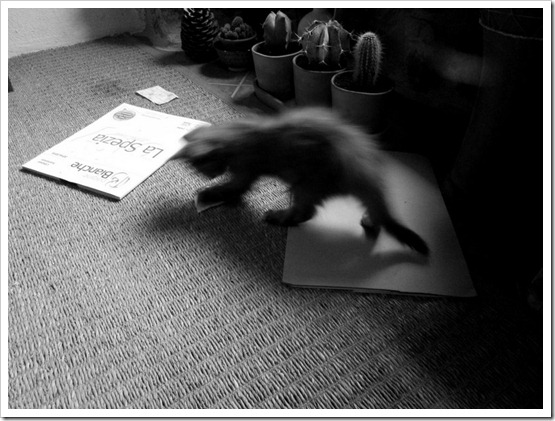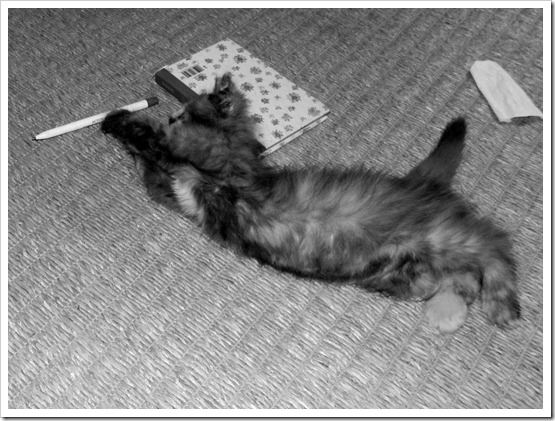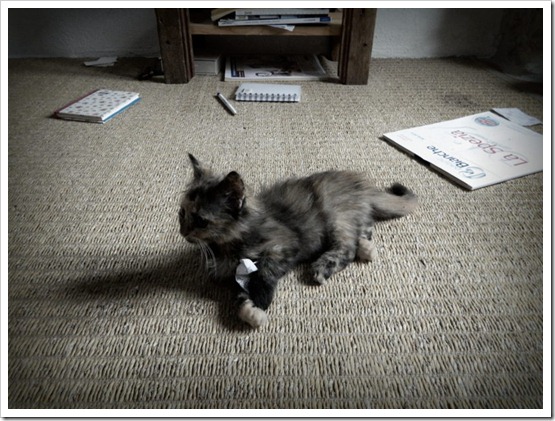Busy Busy Busy! Posted by Serena on Nov 6, 2014 in Grammar
Written by Serena with photos by Geoff
Today’s post is written from the point of view of our two month old kitten Amber, and I’ve kept the language fairly simple (well she is only two months old!). Words and expressions highlighted in purple are explained in the Grammar and Vocabulary section at the end.
Una tipica mattina di Ambra, la nostra gattina di due mesi:
Va bene! Ho fatto colazione, ho fatto ginnastica con Mimì, ho fatto innervosire Gigia, ho morsicato la coda di Cocò, ho fatto i miei bisognini, adesso sono pronta per andare su di sopra in ufficio a lavorare.
Eccomi qui in ufficio: prima di tutto mi devo affilare le unghie sul tappeto di rattane, poi controllerò la cartella dell’Internet Provider. Vediamo se ci sono tutte le ricevute di pagamento? Sì, ci sono tutte, benissimo.
Ora mi serve un numero di telefono, dove lo trovo, sull’Elenco Telefonico o sulle Pagine Gialle? Beh, per sicurezza li tiro fuori tutti e due. E dov’è la penna per scrivere il numero? Ah, eccola lì dove l’avevo lasciata ieri sera. Come rotola bene questa penna, scappa da tutte le parti, non si vuole far prendere!
Toh, guarda un po’, c’è Serena sul divano che lavora al computer, vado a vedere se ha bisogno di aiuto. Uffa quanti libri ci sono sul tavolino accanto a lei, togliamoli un po’ di mezzo.
Sono proprio cotta, dopo tutto questo lavoro mi merito davvero una pausa. Adesso mi faccio un bel riposino sulla spalla di Serena.
Grammar and vocabulary:
Ho fatto colazione = ‘I’ve had breakfast’. First person singular present perfect (Passato prossimo) of the verb fare = to have, to do, to make. It’s constructed with the auxiliary verb avere = to have
ho fatto i miei bisognini = I’ve been to the toilet (literally: I’ve done my little needs)
su di sopra = upstairs (literally: up above)
Eccomi qui = here I am (literally: here I am here)
mi devo affilare le unghie = I have to sharpen my nails. When we carry out an action on ourselves, we use the reflexive form of the appropriate verb, e.g. mi lavo le mani = I wash my hands (literally: myself I wash the hands)
ci sono tutte = they are all there. Tutte (feminine plural) agrees in number and gender with le ricevute = the receipts (feminine plural)
sull’Elenco Telefonico = in the Telephone Directory. N.B. whereas in English we say ‘in a book’, in Italian we say ‘on’, e.g. l’ho letto sul giornale = I read it in the newspaper (literally: I read it on the newspaper)
tutti e due = both of them (literally: all and two). We can use this construction with any number, e.g. tutti e tre = all three of them, tutti e cento = all one hundred of them. This construction changes according to the gender of the thing that it’s referring to, e.g. tutti e tre i libri = all three books, tutte e quattro le ragazze = all four girls
l’avevo lasciata = ‘I left it’. First person singular past perfect (Trapassato prossimo) of the verb lasciare = to leave. This construction uses the auxiliary verb avere = to have. In this case the past participle, lasciata, is feminine singular because it’s preceded by the direct object pronoun la (feminine singular) abbreviated to l’ because it precedes a vowel. See this blog for more explanations: il participio passato.
non si vuole far prendere = doesn’t want to be caught (literally: doesn’t itself want make take)
Toh, guarda un po’ = Wow, look at that! (literally: wow, look a bit) Toh is a sound expressing pleasant surprise
Uffa = Humph! A sound expressing annoyance
togliamoli un po’ di mezzo = let’s move them out of the way (literally: let’s remove them a bit off the middle)
Sono proprio cotta = I’m totally done (literally: I’m really cooked). Cotta (feminine singular) is the past participle of the verb cuocere = to cook. It changes according to the gender and number of the person who is feeling tired
mi merito = I deserve. The reflexive form meritarsi, to deserve, is more common than the non reflexive meritare
mi faccio un bel riposino = I’ll have a little rest (literally: I make myself a nice little rest)
As usual, if you have any questions please leave a comment.

Build vocabulary, practice pronunciation, and more with Transparent Language Online. Available anytime, anywhere, on any device.







Comments:
bdam:
Thanks! Your articles are great for learning the *real* Italian!
Serena:
@bdam Salve! Sono contenta che i nostri articoli ti siano utili.
Saluti da Serena
andreas:
Salve Serena!
Amabra è davvero molto occupata.
‘Ma l’avevo lasciata’ non è Trapassato prossimo?
Saluti da Andrej
Serena:
@andreas Ciao Andrej!
Sì, ‘l’avevo lasciata’ è trapassato prossimo, e in questo contesto può sembrare strano, perché il trapassato prossimo precede un passato, che qui non c’è. Tuttavia ‘l’avevo lasciato’, ‘l’avevo messo’ e simili sono molto comuni, mentre ‘l’ho lasciata’ suona strano all’orecchio. Secondo me è dovuto al fatto che queste frasi sono normalmente usate quando si cerca qualcosa e implichiamo che nel frattempo è successo qualcosa. Per esempio: “Qualcuno ha preso la mia penna? l’avevo lasciata sul tavolo”. In questo caso la consecutio temporum è corretta, ma per analogia usiamo il trapassato prossimo anche quando non c’è un passato prossimo. Spero di essermi spiegata.
Saluti da Serena
andreas:
Salve Serena
Grazie per la risposta. L’uso era chiaro per me. Semplicemente hai scritto nel blog che l’avevo lasciata è passato prossimo e non trapassato prossimo. E ho un carattere noiosissimo perché voglio aver tutto chiaro.
Saluti da Andrej
Serena:
@andreas Grazie Andrej, non me n’ero accorta, adesso correggo subito l’errore. Hai fatto beno a dirmelo.
Saluti da Serena